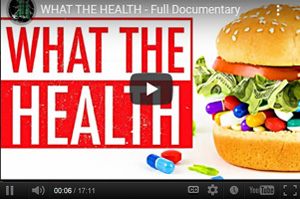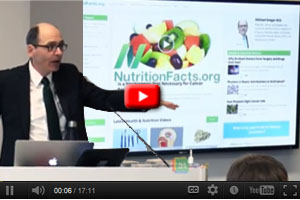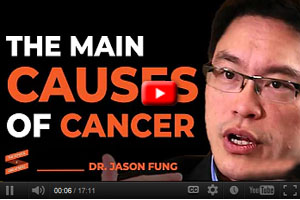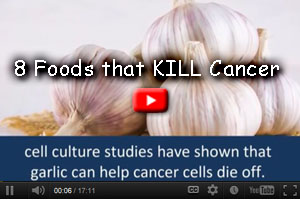
Prostate Health
Enlarged prostate: Does diet play a role?
Can diet help with symptoms of an enlarged prostate?
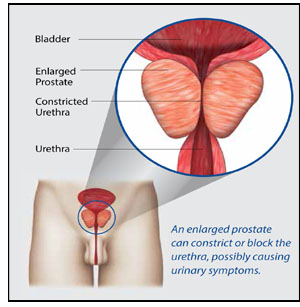 The risk of an enlarged prostate, also called benign prostatic hyperplasia (BPH), increases with age. By age 50, half of men will show signs of BPH. But making some healthy changes to your diet and exercise habits may help you manage BPH symptoms such as increased urinary frequency and urgency.
The risk of an enlarged prostate, also called benign prostatic hyperplasia (BPH), increases with age. By age 50, half of men will show signs of BPH. But making some healthy changes to your diet and exercise habits may help you manage BPH symptoms such as increased urinary frequency and urgency.
While there's no one magic bullet, research suggests that these measures may lessen BPH symptoms:
- Avoid liquids a few hours before bedtime or before going out
- Limit caffeine and alcohol as these may stimulate the urge to urinate
- Eat a low-fat diet. Plant based whenever possible.
- Eat a large variety of vegetables each day.
- Eat a few servings of fruit daily, and be sure to include citrus fruits. Check out out Plant Based Recipes page.
- Participate in moderate to vigorous physical activity most days of the week
- Maintain a healthy weight
Plant Based Recipes page and our Smoothie Recipes page for more healthy diet ideas.
The role of total protein in the diet and its link to BPH is unclear. Some studies found an increased risk of BPH in men who ate more red meat. But other studies found a decreased risk of BPH in men with a high total protein intake, especially protein intake of leaner forms of protein such as fish.
Studies on dietary supplements and herbal therapies - such as saw palmetto, lycopene and beta-sitosterol - and BPH have had mixed results. Ask your doctor for advice before taking supplements.
The bottom line? Healthy habits such as regular exercise, watching your waistline, eating vegetables and fruits, and keeping an eye on dietary fat may help with BPH as well as lower your risk of erectile dysfunction, diabetes and heart disease.
Blueberry Smoothie
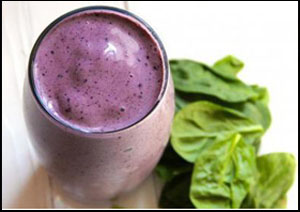 Blueberry Spinach Breakfast Smoothie
Blueberry Spinach Breakfast Smoothie
Berries are always a great fruit (fresh or frozen) to add to smoothies because they are very high in antioxidants and
a good source of fiber. Blueberries are low in calories, high in fiber, and contain vitamin C, vitamin K, and manganese.
They're one of the highest-ranking sources of antioxidants, making them a great disease-fighting fruit.
A delicious and healthy smoothie with blueberries, spinach, banana, strawberries and Almond or coconut milk.
Yields: 2 servings
- 1/2 ripe avocado
- 2/3 cup frozen blueberries
- 2 large frozen strawberries
- 1 cup spinach leaves
- 1/2 cup coconut or almond milk
- 10 drops of Turmeric
- 2 teaspoons protein powder (optional)
Check out our Plant Based Recipes page and our Smoothie Recipes page.
Combine all of the ingredients and blend, cover with the lid, and whirl until smooth. Add more coconut or almond milk if
needed for desired consistency. Pour into two glasses and enjoy promptly.
Healthy Plant Based Recipes that can help REVERSE Enlarged Prostate.
Natural remedies for an enlarged prostate include:
1. Pygeum (African plum extract)
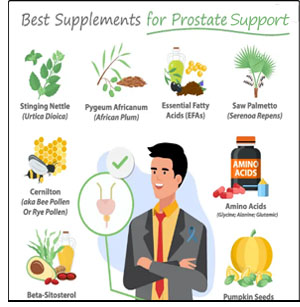
Pygeum has also been shown to contain a wide range of fatty acids, alcohols, and sterols such as beta-sitosterol that have an antioxidant and anti-inflammatory effect on the urogenital tract.
A few studies indicate that consuming between 100 and 200 mg of pygeum extract daily or splitting this into two 50 mg doses twice daily may help reduce BPH symptoms.
2. Saw Palmetto
Saw palmetto is one the most studied and popular herbal supplements used to treat BPH.
Several studies have linked saw palmetto to reduced BPH symptoms. This is most likely because it inhibits the production of dihydrotestosterone (DHT) and reduces the size of the inner lining of the prostate.
However, other studies have not been able to establish whether saw palmetto supplement use has any impact on BPH symptoms compared to a placebo.
Zi-Shen Pill (ZSP)
The Zi-Shen Pill (ZSP) contains a mixture of three plants, including Chinese cinnamon.
The formula comes from ancient Chinese medicine dating back to the 13th century. ResearchersTrusted Source have shown that rats given the Zi-Shen formula have reduced rates of BPH.
More research is needed on humans to determine whether it is effective.
4. Cernilton
Some people use herbal supplements made from rye-grass pollen to treat BPH symptoms. These troublesome symptoms may include being unable to empty the bladder fully and the need to urination frequently at nighttime.
Under the brand name Cernilton, rye-grass pollen is included in the formula of several registered pharmaceutical supplements targeted at easing symptoms of BPH.
Despite its popularity, Cernilton has never been shown to impact BPH symptoms in any large-scale scientific studies. However, some indicate it may help reduce the overall size of the prostate.
Further research is needed to establish if it works or not.
5. Orbignya speciosa (babassu)
Babassu or Orbignya speciosa is a species of palm tree native to Brazil. Several indigenous Brazilian tribes and communities use the dried or ground kernels from the tree to treat urogenital symptoms and conditions.
Oil from babassu nuts has also been shownTrusted Source to inhibit the production of testosterone, while other parts of the nut contain compounds with anti-inflammatory and antioxidant properties.
6. Stinging nettle
Stinging nettle contains similar antioxidant and anti-inflammatory compounds as pygeum and saw palmetto.
Nettle root is sometimes used in combination with saw palmetto. More researchTrusted Source is needed, however, to determine whether it is effective.
7. Cucurbita pepo (pumpkin seed)
Pumpkin seeds contain beta-sitosterol, a compound similar to cholesterol and found in some plants. Preliminary studies have shown that beta-sitosterol may improve urine flow and reduce the amount of urine left in the bladder after urination.
Some studies recommend taking 10 g of pumpkin seed extract daily for BPH symptoms.
8. Lycopene
Lycopene is a naturally occurring pigment found in many fruits and vegetables. One study found that it may help slow the progression of BPH.
Tomatoes are the richest source of lycopene available to most people. But a few other fruits and vegetables contain lower levels of this antioxidant.
Usually, the deeper pink or red the fruit or vegetable is in color, the higher its lycopene content.
Other sources of lycopene include:
- papaya
- pink grapefruit
- watermelon
- guava
- carrots
- red bell peppers
- apricots
- red cabbage
9. Zinc
Chronic zinc deficiencies have been shown to potentially increase the likelihood of developing BPH. Taking zinc supplements, or increasing dietary intake of zinc may help reduce urinary symptoms associated with an enlarged prostate.
Zinc is found in poultry, seafood, and several types of seeds and nuts, such as sesame and pumpkin.
10. Green tea
Green tea has a lot of antioxidants called catechins that have been shown to enhance the immune system and potentially slow the progression of prostate cancer.
It is important to keep in mind that green tea contains caffeine. Caffeine can stimulate the bladder and cause a sudden urge to urinate, potentially worsening BPH symptoms.
Prostate Cancer Diet
Just a few simple changes in your daily eating habits can help support healthier living as you recover from prostate cancer, and may even decrease risk of your cancer coming back or getting worse. All of these recommendations also apply to maintaining overall health, for you and your family.
Vegetables Incorporate cooked tomatoes (preferably cooked with olive oil) and cruciferous vegetables (like broccoli and cauliflower)
into many of your weekly meals. Certain fruits and vegetables contain large amounts of antioxidants. Antioxidants benefit the body by removing
free radicals. Free radicals can attack healthy cells and permanently disrupt their operation.
Fat Try to keep the amount of fat that you get from red meat and dairy products to a minimum. Several studies have reported that
saturated fat intake is associated with an increased risk of developing advanced prostate cancer, while long-chain omega-3 fatty acids
(the “good fat” found in fish such as salmon) are associated with lower risk. Avoid processed meats (lunchmeats) that contain nitrates,
or charred meat, which have been shown to have cancer-promoting properties. Choose fish, lean poultry, or plant-based proteins such as
nuts and beans instead.
Vitamins Try to get your vitamins from food sources, that is, eating a diet rich in vegetables and whole grains, rather than
relying on vitamin supplements. In particular, avoid calcium substitutes. Plant-based sources of calcium include dark green leafy vegetables,
soy, and almonds.
 SMOOTHIE RECIPES for Fighting Cancer SMOOTHIE RECIPES for Fighting Cancer
|
|
 Strawberry Mango Smoothie
Strawberry Mango Smoothie
|
|
 Blueberry Spinach Smoothie
Blueberry Spinach Smoothie
|
|
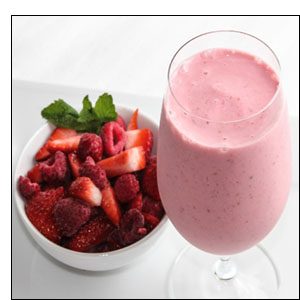 Raspberry Strawberry Smoothie
Raspberry Strawberry Smoothie
|
|
|
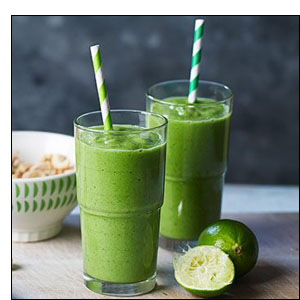 Kale Smoothie
Kale Smoothie
|
|
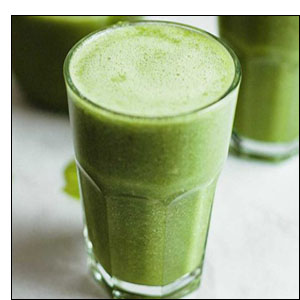 Shamrock Smoothie
Shamrock Smoothie
|
|
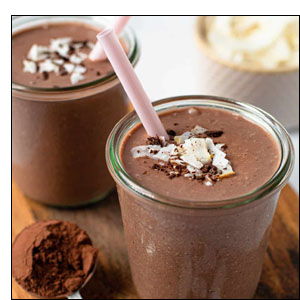 Chocolate Coconut Smoothie
Chocolate Coconut Smoothie
|
|
|
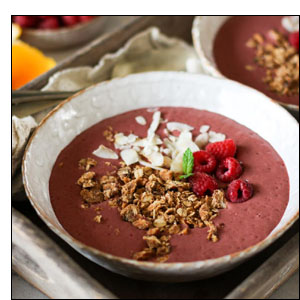 Banana Raspberry Smoothie Bowl
Banana Raspberry Smoothie Bowl
|
|
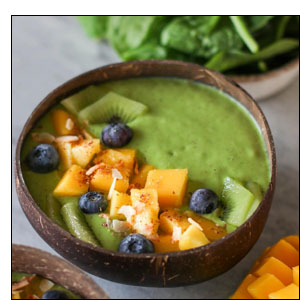 Mango Spinach Smoothie Bowl
Mango Spinach Smoothie Bowl
|
|
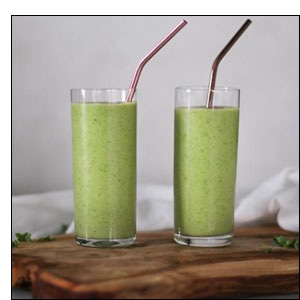 Mango Peach Green Smoothie
Mango Peach Green Smoothie
|
|
|
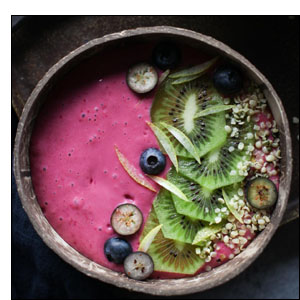 Raspberry Lemonade Smoothie Bowl
Raspberry Lemonade Smoothie Bowl
|
|
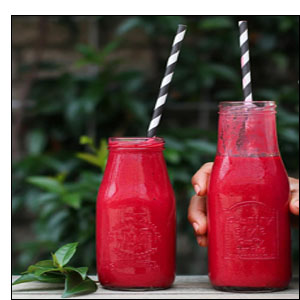 Pink Sunrise Smoothie
Pink Sunrise Smoothie
|
|
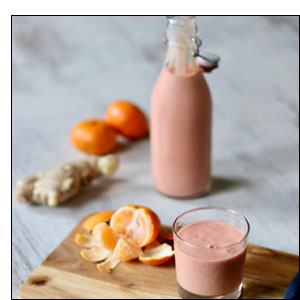 Orange Ginger Sunrise Smoothie
Orange Ginger Sunrise Smoothie
|
|
|
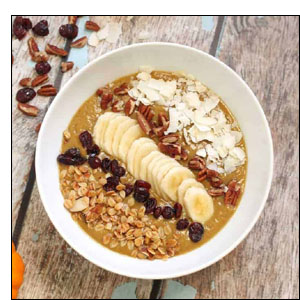 Pumpkin Spice Smoothie Bowl
Pumpkin Spice Smoothie Bowl
|
|
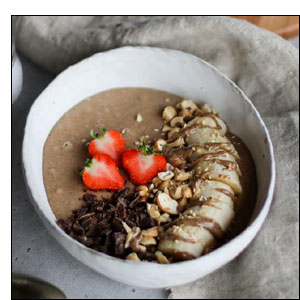 Salted Caramel Smoothie Bowl
Salted Caramel Smoothie Bowl
|
|
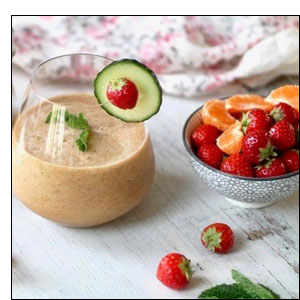 Strawberry Pineapple Mint Smoothie
Strawberry Pineapple Mint Smoothie
|
|
|
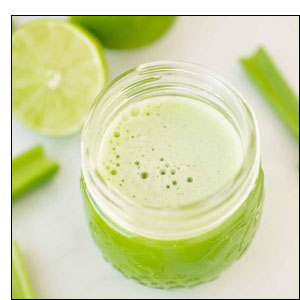 Anti-Cancer Smoothie
Anti-Cancer Smoothie
|
|
 Cucumber Lemon Ginger Juice
Cucumber Lemon Ginger Juice
|
|
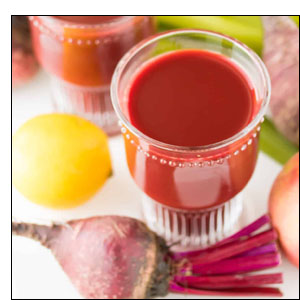 Beet Juice Detox
Beet Juice Detox
|
|
|
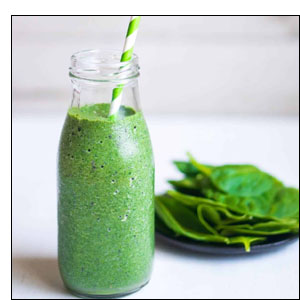 Green Smoothies
Green Smoothies
|
|
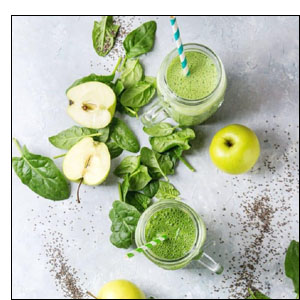 Apple Spinach Green Smoothie
Apple Spinach Green Smoothie
|
|
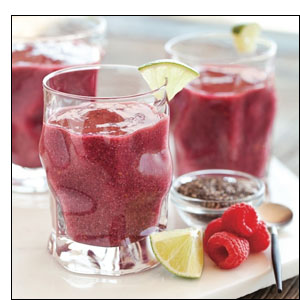 Cherry Berry Lime Smoothie
Cherry Berry Lime Smoothie
|
|
|
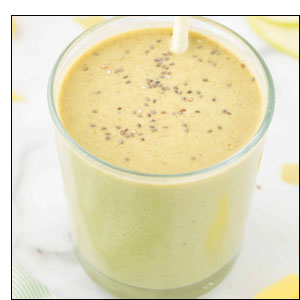 Green Apple Spinach Smoothie
Green Apple Spinach Smoothie
|
|
 Strawberry Banana Oatmeal Smoothie
Strawberry Banana Oatmeal Smoothie
|
|
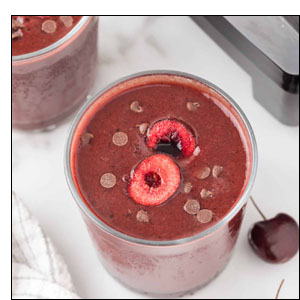 Chocolate Cherry Smoothie
Chocolate Cherry Smoothie
|
Guidelines for a Healthy Diet
Your diet should be:
- Primarily plant-based
- Include plenty of fruits and vegetables
- High in fiber
- Low in fat
- Limited in the amount of simple sugars
In addition, drink adequate fluids and be physically active to help achieve and maintain a healthy weight.
Plant-Based Diet
A diet that is primarily plant-based includes the following:
- Fruits and vegetables
- Whole grains
- Beans and legumes
- Other plant protein sources
Fruits and Vegetables
It is important to eat plenty of fruits and vegetables. Here are a few reasons why:
- They contain vitamins, minerals and fiber as well as various cancer-fighting phytochemicals, such as carotenoids, lycopene, indoles and flavonols.
- There is consistent evidence that diets high in fruits and vegetables are associated with decreased risks of many cancers. While results for prostate cancer risk are not yet conclusive, they are promising.
- Men who consumed at least 28 servings of vegetables per week had a reduced risk of prostate cancer compared with those who ate fewer than 14 servings per week.
- There is some evidence that vegetables — particularly cruciferous vegetables like broccoli, cauliflower, cabbage, kale, Brussels sprouts and bok choy — may be associated with a reduced risk of prostate cancer.
- Men who ate three or more servings of cruciferous vegetables per week had a 41 percent decreased risk of prostate cancer compared with men who ate less than one serving per week.
- The benefit of fruits and vegetables in regards to cancer protection may be related to high amounts of carotenoids in certain fruits and vegetables, according to some key population studies.
- One study indicated that fructose, or fruit sugar, resulted in a lower risk of prostate cancer.
Be sure to:
Consume at least five, preferably eight to 10, servings of fruits and vegetables daily for their cancer protective effects.
One serving equates to:
- 1/2 cup fruit or vegetable
- 1 cup raw leafy greens
- 1/4 cup dried fruit or vegetable
- 6 fluid ounces of fruit or vegetable juice
Fiber
A plant-based diet is naturally high in fiber, which has a number of benefits:
- Fiber may bind to toxic compounds and carcinogens, which are then later eliminated from the body.
- A high-fiber diet works to reduce hormone levels that may be involved in the progression of prostate cancer.
- One study indicated that a high-fiber, low-fat diet followed only for 10 days resulted in serum changes that reduced the growth of prostate cancer.
- Prostate cancer mortality is inversely associated with consumption of cereals and nuts or seeds, according to a study in the Journal of the National Cancer Institute.
- A diet rich in natural fiber obtained from fruits, vegetables, legumes and whole grains such as whole-grain cereals and breads may reduce cancer risk and reduce the risk of prostate cancer progression.
What else to do:
Aim for 25 to 35 grams of fiber daily. To get more fiber, choose breads with three or more grams of fiber per slice. The first ingredient
on the label should be whole or sprouted grain flour, not white flour or unbleached white flour. Also, include whole grains - such as oats,
barley, quinoa, amaranth, bulgur and millet - in your diet.
Low-Fat Diet
Eating a low-fat diet has many benefits. Here are some points to keep in mind.
- The increased cancer risk observed in developed countries may be, in part, due to the fact that a high-fat diet stimulates increased
levels, which is known to be associated with prostate cancer growth.
- A comprehensive review reported that 24 of 32 studies found positive, although not all statistically significant, associations between
dietary fat intake and prostate cancer risk.
- Prospective studies to date, however, have failed to find a consistent association between prostate cancer and overall fat intake.
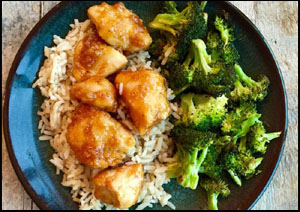 Honey Garlic Chicken
Honey Garlic Chicken
A 2013 study published in the Asian Pacific Journal of Cancer Prevention associated garlic with a decreased risk of prostate cancer.
It is thought that garlic’s potent smell is how it works its cancer-fighting magic.
Researchers suspect that the sulfur in garlic is
activated when chopped, and that smell is released.
It’s these compounds, they believe, that may help destroy prostate cancer cells.
More research is needed, but it's just another reason to toss more garlic cloves in to dishes.
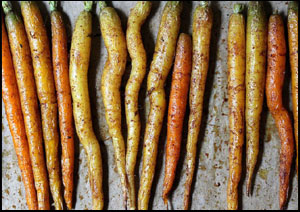 Curry Roasted Baby Carrots
Curry Roasted Baby Carrots
Research has found that high carotenoid (what makes carrots orange) intake can help reduce the incidence of certain types of cancer,
including prostate, by up to 50 percent.
That’s reason enough to chomp on these babies.
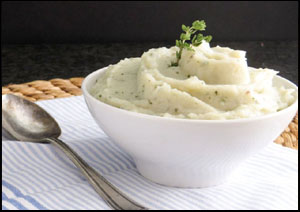 Mashed Cauliflower with Roasted Garlic
Mashed Cauliflower with Roasted Garlic
Cauliflower is part of the cruciferous vegetable family, which also includes cabbage, broccoli, and mustard greens.
This group of vegetables
contains a compound called sulforaphane, which was shown to help stop the growth of prostate cancer cells.
*These statements have not been evaluated by the Food and Drug Administration. These products are not intended to diagnose, treat, cure, or prevent any disease.
|


